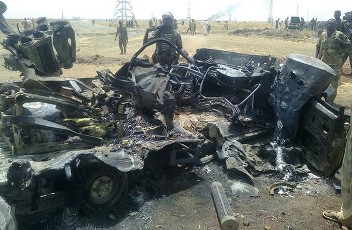North & South Sudan negotiators head to Addis Ababa for discussions on security
March 28, 2012 (KHARTOUM) – The governments of Sudan and South Sudan have sent their delegations to the Ethiopian capital Addis Ababa to discuss ways by which they can defuse the recent military flare-up on the borders of the two countries this week.

But Kiir’s assertions regarding control of Heglig were contradicted by SPLA field commanders and later South Sudan’s army announced that it has disengaged and returned to its old positions inside the country’s borders.
Officials in Khartoum however, said that SAF units fought back SPLA and pushed it off Sudan’s territory.
But the ramifications of the clashes were far reaching and a long-awaited summit between Kiir and his Sudanese counterpart Omer Hassan al-Bashir set for April 3rd was called off by Khartoum. The latter said that environment no longer conducive for such talks.
In an encouraging sign that situation will not escalate, the two countries stressed that they have no intention of engaging in a full-scale war.
On Wednesday, military delegations from the two countries met at the expert level to prepare for the joint political-security meeting that will be chaired by defense ministers from Khartoum and Juba.
Sudan’s Undersecretary of Foreign Affairs Rahamatalla Mohamed Osman told Agence France-Presse (AFP) that he was in Addis Ababa “to represent my country in the negotiations… with regards to security along the border”.
“I am not sure we can accept any more offers [from the South],” Osman said, warning the clashes could create a stalemate.
“We are talking about security arrangements at a time when there are attacks,” he added.
The SPLM Secretary General and South Sudan’s top negotiator Pagan Amum said he is also heading to Ethiopia.
“What we expect to achieve is the cessation of hostilities,” Amum said by telephone from the South Sudanese capital.
“We will stop the fighting that is there, and ensure that this does not erupt into war between the two countries” Amum added and urged both sides to “rescue the positive spirit” of earlier talks.
In Khartoum, the Sudanese foreign ministry spokesperson Al-Obeid Marwih said that reversing the decision on Bashir-Kiir summit is contingent on progress at the security talks.
AFRICAN UNION REACTION
In a related issue, Marwih also criticized the African Union (AU) statement on the clashes calling it “unbalanced” and “equating the victim with the executioner”.
The pan-African body said Wednesday it was deeply concerned at an “escalating security situation” on the border between the former civil war foes, and called for troops to pull back 10 kilometers (six miles) either side of the border.
The AU on Wednesday joined the European Union and United Nations Security Council in calling for an end to the fresh fighting around the oil-rich town of Heglig, which includes ground fighting on both sides of the border and aerial bombardment of South Sudan’s Unity State.
In a statement, AU chief, Jean Ping, called on both sides to withdraw their army 10km from either side of the shared border; establish a Joint Border Verification and Monitoring Mission (JBVMM); and halt any support to rebel forces operating in the territories of the other country.
Ping further urged on the two states to respect the non-aggression and cooperation pact they signed last month.
Last month, representatives from Sudan and South Sudan met in the Ethiopian capital, Addis Ababa, where they signed an initial agreement on issues of nationality and demarcation of their common boundary.
Sudanese President, Omer Al-Bashir, was scheduled to meet his southern counterpart, Salva Kiir Mayardit, on 3 April in Juba to officially ink the Addis Ababa agreement.
Khartoum announced it had cancelled Bashir’s planned trip to Juba after the clashes on Monday. But South Sudan has maintained it has received no official notification and say they expect the talks to go ahead.
The AU said “it is critical that appropriate steps be taken to create an environment conducive to the holding of the planned Summit between the two Presidents and the continuation of the post-secession negotiations”.
The EU and the UN Security Council on Tuesday, called on the governments of Sudan and South Sudan to exercise maximum restraint and engage in negotiations.
Sudan and South Sudan have traded accusations over the eruption of the latest fighting, which is said to be the most grave since South Sudan seceded in July last year.
(ST)
